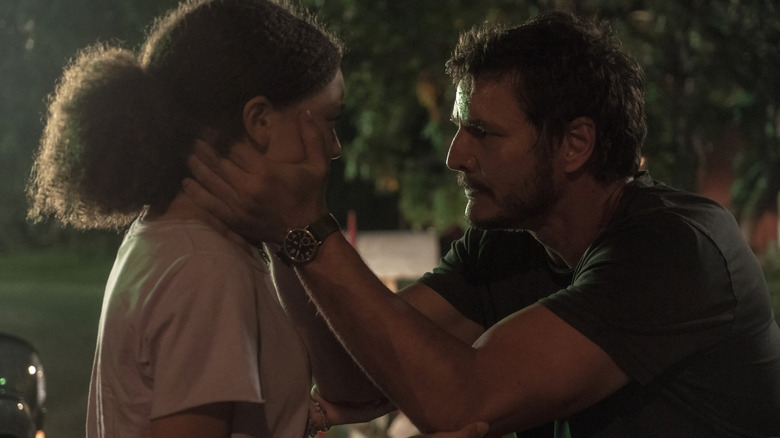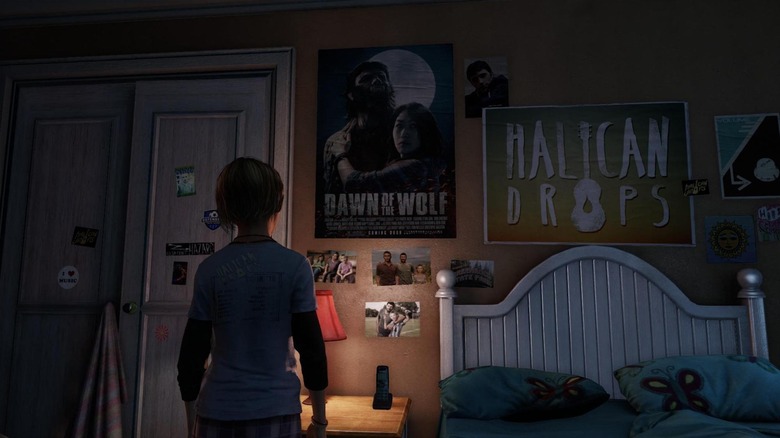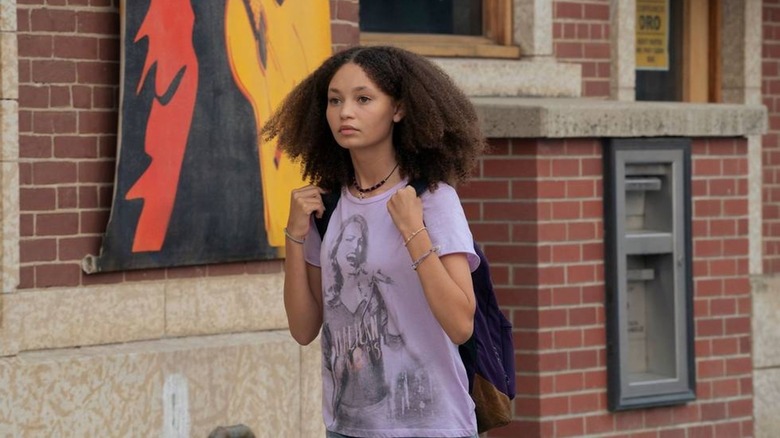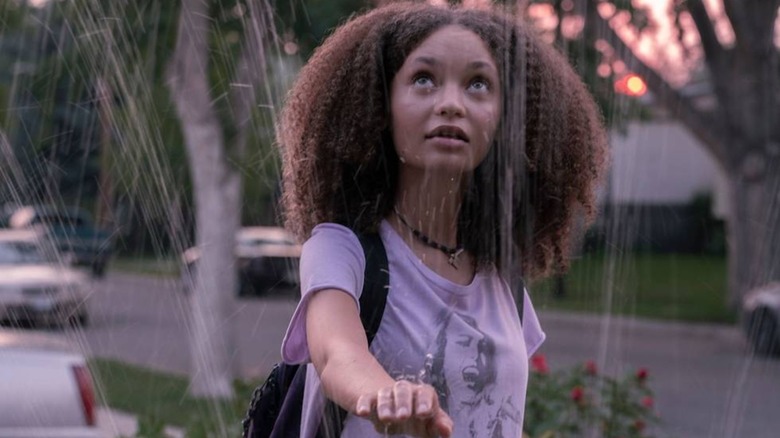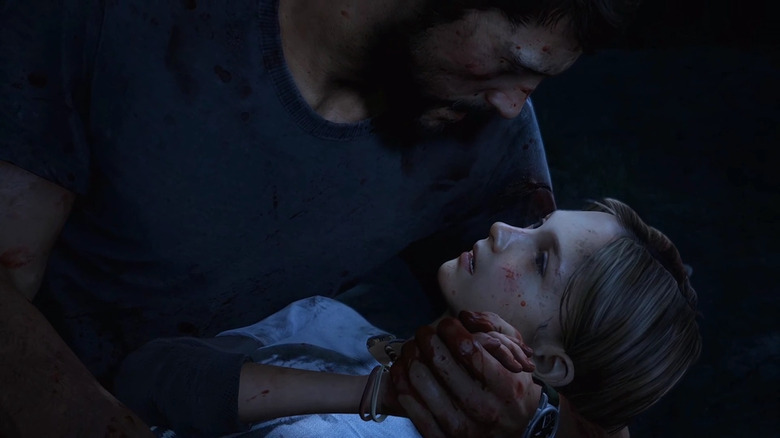How HBO's The Last Of Us Learned A Lesson In Perspective From The Video Game
This post contains spoilers for "The Last of Us" season 1 episode 1.
Video game adaptations have a rocky history, to say the least. The creatives in charge have all the same challenges that come with any kind of adaptation, but when it comes to video games there's a special level of difficulty that many have failed to overcome.
With a novel or comic book, the filmmakers must compete with the "mind movie" that plays in a reader's head while they're experiencing a story for the first time. With video games, they have to ask their audience to do all that PLUS relinquish control.
That's the crazy thing about video games. Even when there's a game that's on rails (aka you're playing through a straight storyline and your choices don't change the course of the narrative), fans still feel like they're in control. It's not Master Chief that races his Warthog through the Covenant ship to get evac'd out at the last possible second, it's the person hopped up on Mountain Dew holding the controller who gets that win for humanity
Video game adaptations are in the same early days as comic book adaptations were pre-"X-Men." Yes, there have been some successes, but many more failures and the prevailing opinion is that video games work because the player is an active participant and video game adaptations fail because the cinematic and streaming experience is passive.
"The Last of Us" is uniquely positioned to be one of the rare breakthrough good adaptations because the original Naughty Dog game is not only driven by story and character, but it has one foot in cinematic language already.
Point of view is everything
The best example of that is how the original game uses perspective to really sock you in the gut at the beginning of the story, a storytelling trick that was not overlooked in the adaptation.
When "The Last of Us" begins, the very first character you control isn't either of the game's actual protagonists, Ellie or Joel. You start by playing a tween girl named Sarah, Joel's daughter.
After the opening cinematic in which we get a quick, but authentic and touching, glimpse at the lovable father/daughter dynamic between Sarah and Joel as she gifts him a new watch in the final minutes of his birthday, the player controls the young girl as she wakes up alone in the house as all hell is breaking loose outside.
As the fungal zombie invasion begins, we experience it through Sarah's eyes, which in video game language is telling us that she's one of the main characters and thus is safe.
Joel and Ellie being the main characters of the game series wasn't common knowledge, you have to remember. Most people registered a gruff looking dude and a young girl on the cover and the assumption was that the girl was Joel's daughter.
Sadly, Sarah doesn't make it to the main titles, a gut punch that still, to this day, is a high watermark for any video game opening. The acting by Hana Lani Hayes and Troy Baker is a huge part of why that opening is so effective, but the real reason so many people are taken off-guard by this tragic turn of events is that, up to that point, everything you know about playing video games has told you that she was supposed to be safe.
Much like the game, HBO's adaptation starts off from Sarah's perspective
Sarah's a kid (and they don't kill kids in video games, right?), but beyond that she was our introduction to the world, the eyes through which we see society's dominos start to fall. Creative Director Neil Druckmann understood video game language and used it against the player, and really managed to traumatize a whole generation of gamers.
But how do you translate that same feeling into a passive medium where the person experiencing the story isn't playing the characters on the screen? The answer, my friends, is all about perspective.
Showrunner Craig Mazin and Naughty Dog's Neil Druckmann understood that they had to start off their very expensive adaptation by telling the story through Sarah's eyes.
For the first 30 minutes of the first episode, we follow Sarah (Nico Parker) going about her day. She cooks her dad breakfast, she goes to school, she ventures into town to get her dad's broken watch repaired for his birthday, she visits the kindly elderly next door neighbors. It's all so ... normal.
Manipulation is the name of the game
Film and TV language is telling the audience this is the main character. We're not following Joel as he goes about the final day of normal life before the world ends, we're following this young girl. So, when the s*** hits the fan and Sarah ends up dying in Joel's arms, it should have the same effect on the HBO audience watching this series fresh as the game did 10 years ago.
Is this a bit manipulative? Yeah, sure, but so is all storytelling, really. Every movie you see or book you read or streaming series you watch is going to be manipulating you in some way, whether it's a strategic cut to not reveal the face of the killer in "Scream" or John Williams swelling the orchestra as Elliott says goodbye to ET.
What people get angry about is lazy manipulation that acts as a shortcut to actually investing in a character or storyline.
There are many good reasons to start off this story with a total bummer
The brilliant thing about the sad opening to "The Last of Us" (both the game and the series) is it sets up multiple things at once. First of all, it signals to you that nobody is safe in this world, including the main characters. Secondly, it sets the tone for the whole story that's about to unfold. You're going to love the characters and be scared to death something's going to happen to them the whole way through, so you'd better get used to it.
Most importantly, though, Sarah's unexpected death gives us an immediate understanding of both the dark and light sides of Joel Miller. You know why he spiraled after the world ended and you also know why he's reluctant to be put in charge of keeping another young woman safe.
As they go on their journey together and their bond strengthens, you don't need to be told why Joel, the ultimate kill-or-be-killed survivor, has a soft side. You've already seen why.
None of that would be as powerful if the story opened with Joel and his brother, Tommy, going to the construction site as signs of the infection started popping up. So, thanks to that particular perspective trick, the audience gets a bunch of info all at once and they don't even realize it.
It's that kind of understanding of what made the video game so effective that gives me hope that this series could very well be a sort of Rosetta Stone of how to adapt video games correctly. If they ever crack that particular nut then we're in for at least a decade or two of truly crazy adaptations.
